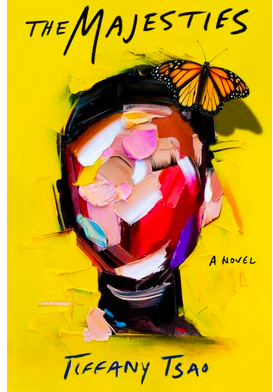The Majesties by Tiffany Tsao
Atria Books, an imprint of Simon & Schuster
Reviewer: Caitlin Hicks
Tiffany Tsao’s novel The Majesties opens brutally: the reader is in the mind of a young woman as she lies in intensive care, the sole survivor of a mass murder at the birthday of a family’s beloved patriarch where everyone gathered around a lavish meal, dressed to the nines. Gwendolyn reimagines her sister Estella pouring the poison in the shark fin soup in the gleaming restaurant kitchen and recounts her vision of a roomful of over 300 guests of all ages in their fashionable finery retching and twisting and vomiting through the last moments of their lives.
The rest of the novel takes place inside Gwendolyn’s head as she tries to understand why her sister would do such a thing. The book begins with this sentence: “When your sister murders three hundred people, you can’t help but wonder why—especially if you were one of the intended victims—though I do forgive her, if you can believe it.”
Indeed. It’s a fantastic hook for a novel that is described as a “thriller” (for want of a precise description), a book that is more a psychological study of people raised with a golden spoon in their mouths. It’s a story about an Indonesian Chinese family with their various businesses, vacations, schooling, travels, marriages, and frequent family gatherings.
Their troubles arise from their separation from the “plebes” of the world, the excess of their wealth and privilege, a condition that is both acknowledged and unseen: like the frog content to sit in a pot of water on top of the stove as the water gets warmer and hotter until at last, he’s cooked by the very thing that surrounds him.
Gwendolyn goes back into the past, searching for the clues that would warrant her close friend and sister to poison them all. The reader sits on her shoulder, wondering What could possibly warrant the murder of an entire family?
The two protagonists Gwendolyn and Estella are close, loving each other in a way that sisters who’ve relied on each other throughout their lives are capable of doing. The very compelling opening thread holds the book together even as both characters wander away from each other through their sheltered world—all taking place in the memory of Gwendolyn from her sick bed.
Looking closely at her relationship with her extended family, but mostly with her beloved Estelle, Gwendolyn stumbles upon things in plain sight by closely analyzing past events. Together the sisters track down a long-lost favorite yet rebellious aunt who appears in a photo well after she supposedly “drowned” on a boating excursion; alongside the sisters, the reader feels the excitement and suspense of finding this aunt years later. This aunt who struck Gwendolyn as genuine and truthful in a way the rest of her family wasn’t.
What does she look like now after all these years? Why did she “disappear” herself? And Leonard, the abusive husband of Estelle who “died”—the reader is only partially informed about the cause of his death, making this dropped fact part of the tension to reveal answers to the deadly puzzle Gwendolyn mulls over and over. When the cause of Leonard’s death is finally revealed, the frog in the water is simmering.
But there is more, under everyone’s noses, things that don’t really seem like secrets but more like people going about their privileged lives doing what they are entitled to do. That this family gets away with these breeches of morality and exactly what these things are, and how easily they unfold, is a shocking study of the possibilities for a different kind of abuse of wealth.
The book is written in an easy style of prose that is both taut and descriptive, the characters sympathetic, the elevated lifestyle so easy for the reader to soak up from this side of the page. There is an entire aspect of an obsession of insects that is skillfully woven into the narrative and personalities of the two main characters.
The Majesties, although it rolls out easily, troubles deeply, haunting and even chilling its reader well beyond the final page.
This review first appeared on New York Journal of Books



